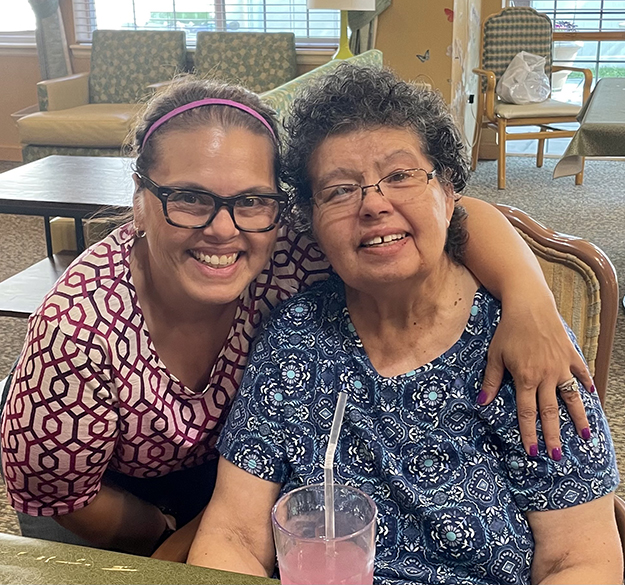
When Lisa Solano of Arvada learned that her mother was diagnosed with Alzheimer’s disease, she knew there would be challenges ahead. She just didn’t know how complex they would be.
Lisa’s mom, Julie, was diagnosed with dementia in 2008 at age 67. Her parents had retired to Pueblo, and her father served as his wife’s daily caregiver. He viewed caring for his wife as his responsibility. Lisa visited as often as possible to provide support but travelled out of state full-time so ability to help was limited.
But, as many family members learn, caregiving day-in-and-day-out is a heavy burden. A 2017 poll found that 27% of dementia caregivers delayed or did not do things they should in order to maintain their own health. And 18% of Alzheimer’s caregivers die before the person for whom they are caring.
The toll of caregiving
After about 8 years of being his wife’s sole caregiver, Lisa believes the toll became too much for her father. After decades of sobriety, he resumed using alcohol.
“Perhaps he was using alcohol to self-medicate,” Lisa said. “Eventually, it put my parents at a state in their relationship where dad couldn’t provide care (to Julie). That was a dangerous place in their relationship.”
Given the challenges facing both of her parents, Lisa tried parenting from afar. She could see that as his alcohol abuse increased, her father did not have the coping skills needed to deal with his wife’s illness. And the combination of stress and alcohol affected his health as well.
“It is hard for me to manage remotely,” said Lisa. “I still feel that burden today. Now, all of a sudden, I’m the parent. I know there’s support for me, but it’s hard to caretake for myself so I can be the best caretaker for them.”
A turning point
The turning point for the Solano family came during the holidays of 2018. After a family argument over the deteriorating situation, Lisa called the free Alzheimer’s Association Helpline and received some immediate guidance on how to proceed.
“It’s a great place to start,” said Lisa. “I started to learn about mom’s disease and medication, and I learned that I needed help to perhaps take a different approach to care for and support my parents.”
Not long after, Lisa helped her parents move into assisted living in Pueblo.
“It was clear that mom could no longer perform daily activities, and dad could no longer do it for her,” Lisa said. “There’s not enough training and support to teach caregivers how to provide care.”
As Julie’s dementia progressed, it became difficult for her husband to comprehend why he shouldn’t spend all of his time with her in the memory care unit, so Lisa helped settle them into different care facilities.
“When you’ve been married 55 years, it’s difficult to understand that you can’t be with your spouse,” Lisa noted.
Hispanic heritage
The 13-year Alzheimer’s journey with her parents has taught Lisa many lessons about the disease, the challenges of affording care, and even the impact her own heritage has on dementia.
Learning that Americans of Hispanic/Latino heritage are 50% more likely to develop Alzheimer’s than their White counterparts, Lisa is interested in understanding why.
“I want to take part in research trials with people of my background,” she said. “The Alzheimer’s Association is a key participant in trying to help people affected by this disease.”
Volunteering
Lisa has also taken her involvement to another level. She recently joined the Alzheimer’s Association legislative advocacy team, which works with legislators to raise awareness of the disease and its impact on members of the community, and to advocate for legislation as well as increased federal funding for research. As part of the advocacy team, she recently met with the office of U.S. Rep. Ed Perlmutter to urge his support of the Alzheimer’s Caregiver Support Act.
Lisa describes the services her family received from the Alzheimer’s Association as invaluable and knows additional caregiver resources throughout the country can help millions of families facing the same challenges. The Alzheimer’s Caregiver Support Act will provide grants to community health centers, senior centers and state agencies for training and support services for families and unpaid caregivers of individuals living with Alzheimer’s disease or another dementia.
“I want to help people learn from my experience,” said Lisa. “I also want to be part of the community of support. I don’t want my mom’s life to be lived without me trying to help someone else. Getting involved with the Alzheimer’s Association will help me help others.”
Alzheimer's Association
The Alzheimer's Association leads the way to end Alzheimer's and all other dementia — by accelerating global research, driving risk reduction and early detection, and maximizing quality care and support. Our vision is a world without Alzheimer's and all other dementia.™ For more information, visit www.alz.org or call the 24/7 Helpline at 800.272.3900.